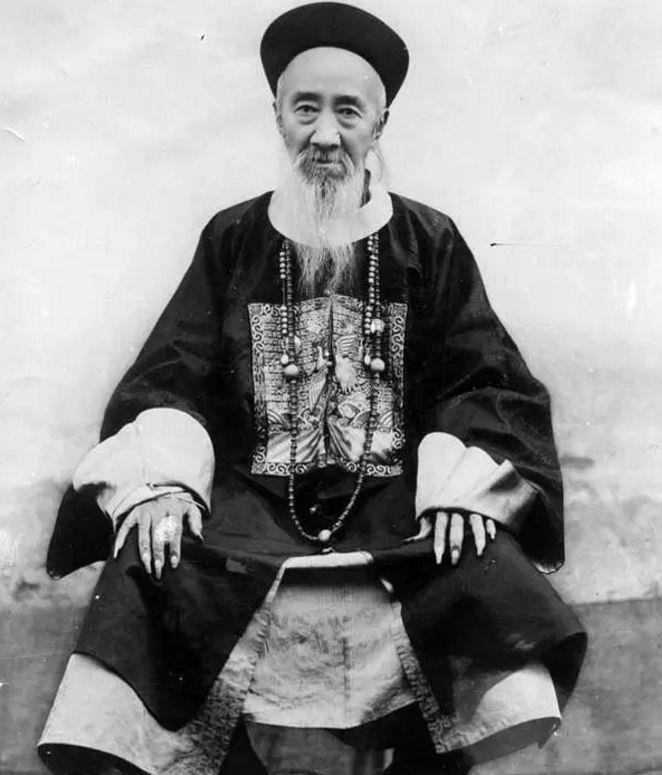The governor of Huguang, Zhang Zhidong, had a large shelf, and he generally did not see guests, and even his subordinates sometimes found it difficult to see him for a day.
However, if a foreigner comes to him and agrees to meet at 3 o'clock, he will definitely wait in the restaurant at 2:30, and will never let the foreigner wait for a while and a half. At the meeting, Zhang Zhidong's face was full of joy, and he was respectful and respectful, even if he was tired, he had to hold on strongly, which could be described as sincere.

Zhang Zhidong was one of the four famous ministers of the late Qing Dynasty, and along with Zeng Guofan, Zuo Zongtang, and Li Hongzhang, he had been engaged in foreign affairs for many years, and he should have seen the big scene. Even he reacted in front of the foreigners, let alone the rest of the officials?
In the late Qing Dynasty, officials were almost a common state of fear of foreigners. One of the things they fear most is to deal directly with foreigners.
Many officials flaunted their might in front of the people, in the fish and meat townships. But once you meet a foreigner, you immediately keep a low profile. When encountering disputes involving foreigners, we should try our best to calm down the foreigners, and we would rather Chinese suffer a little loss than offend the foreigners, and even do our best to please the foreigners.
Why?
In the late Qing Dynasty, the vast majority of officials did not understand foreign languages, did not know the general situation of the world, did not know public international law, and were inevitably left and right when dealing with foreigners. As for the increasing number of Disputes between China and the Ocean, they are even more unable to handle them, and if they are not careful, they will not be able to eat and walk, and will cause serious diplomatic disputes -- that is, the matter of losing officials or even losing their heads.
In the long run, officials have generally formed a mentality of "fearing the ocean like a tiger".
The British Minister Plenipotentiary to China, Wittoma, often dealt with the Prime Minister's Minister's Office of State Affairs, the central body of the Qing Dynasty, which was responsible for handling foreign affairs and foreign affairs, and was most familiar with the style and habits of officials in this department.
Every time Wittoma went to the Prime Minister's Gate, he was given a very solemn reception, "There must be wine and fruit, and the king will sit with the guests, and if he takes food as the priority of negotiation." "However, when it comes to handling affairs, the officials of the Prime Minister's office have no opinions at all, and they will not easily express their opinions.
Once, when Wittema came to the Prime Minister's office again, he said, "The weather is very good today." After saying this, no one dared to take his words. After a while, Shen Guifen, who was also the minister of the prime minister yamen as the minister of military aircraft, replied: "Today's weather is good. ”
As soon as the words stopped, the ministers and Zhang Jing replied one after another: "Today's weather is good." ”
Faced with this situation, Wittoma was angry and funny, and when he returned, he wrote in his diary: "It is like the barking shadow of a dog barking in the clouds." This means that it is no different from a dog barking when it sees a shadow and hears a voice.
The second step in the formation of the mentality of "fearing the ocean like a tiger" must be to worship the foreign world.
In the late Qing Dynasty, Zeng Guofan, Zuo Zongtang, Li Hongzhang and others promoted the foreign affairs movement and established a large number of foreign affairs enterprises. In these enterprises, foreigner employees have high status and high salaries, far exceeding Chinese employees who do the same job.
The Qing Dynasty scholar Kong Guangde compiled the "Collection of Putian Loyalty and Indignation" volume VII recorded: "Every time the word 'foreigner' is heard in the world, it is clever, and the monthly salary is as much as seven or eight hundred gold, and the amount is as low as two or three hundred gold." ”
This means that the salary of a lowest-ranking foreigner employee is also 200 taels of silver per month. What is this concept? The annual salary of a Sipinjing official in the Qing Dynasty was 105 taels of silver, and with the addition of Lu Mi and Enfeng, it was only about 200 taels of silver. The monthly salary of a lowest-ranking foreigner employee is equivalent to the annual salary of a sipin-kyo official.
So, is it possible not to use foreigner employees in foreign enterprises? The answer is: No.
Wen Tingshi wrote about such a thing in the "Zhi Guo Xuan Man Pen":
"Li Hongzhang wants to set up a bank, and Yan Jingming is more like this, but he does not want to use foreigners." Li Hongzhangyun: 'If you don't have to be a foreigner, people don't believe in your household.' ’”
It can be seen from this that in that era, even a high-ranking official like Li Hongzhang believed that if he wanted to set up a bank, he must rely on foreigners, otherwise things would not be able to be done.
[References: "Bamboo Sawdust of the Qing Dynasty", "Zhi Guo Xuan Man Pen", "Qing History Draft", etc.]